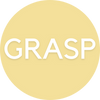Let's talk about it: breastfeeding vs bottle-feeding
In my own parenting journey, and in talking to those around me, probably the question of how you feed a baby is one that causes the biggest stir. On the one hand, new parents feel an enormous pressure to a) do right by their baby, and b) find a solution fast. On the other hand, people often have strong opinions on either breast- or bottle-feeding, informed by their own experiences they are keen to share.

If you’ve been following GRASP, you know we’re out to inspire confidence in parenting; helping to navigate the minefield of information on any part of raising kids without overwhelming you. It’s probably why we’ve not talked much about infant feeding. But - in all gentleness! - here’s a little summary of each side..
Breastfeeding and bottle-feeding are two methods of providing nourishment to infants. Both methods have their advantages and disadvantages, and parents should be able to make an informed decision based on their individual circumstances.
First, breastfeeding.
Breastfeeding is, as it sounds, feeding baby milk directly from the mother’s breasts. There are lots of advantages to this:
- Nutritional Benefits: Breast milk is tailored to meet the nutritional needs of an infant, and it contains essential nutrients that help promote growth and development. Breast milk contains antibodies that can help protect infants from infections and illnesses that the mother is currently fighting off, helping protect the baby from them.
- Bonding: Breastfeeding provides an opportunity for mothers and infants to bond. The skin-to-skin contact during breastfeeding causes the release of happy hormones that can help promote emotional bonding, and also helps regulate a mother's milk production.
- Cost-effective: Breastfeeding is cost-effective as it does not require any additional expenses such as bottles or formula.
- Convenient: Breast milk is always available, and there is no need to prepare or warm it. This can be particularly useful during night feeds.
But breastfeeding is not without its challenges:
- Physical Discomfort: Breastfeeding can be physically uncomfortable for some mothers, particularly during the early days when the infant is learning to latch on.
- Time-sensitive: The success of establishing breastfeeding depends a lot on the early hours and days after the baby is born, and how the journey is started. Even once established, milk supply is regulated by how often and how regularly the baby feeds.
- Time-consuming: Breastfeeding can be time-consuming, and some mothers may find it difficult to manage feeding schedules, particularly if they return to work.
- Limited mobility: Breastfeeding can limit a mother's mobility as she needs to be physically present to feed the infant.
- Lack of support: Some mothers may not receive adequate support, either from their family or their employer, which can make breastfeeding more challenging. While some places in the UK have great breastfeeding groups and support, and communities that are supportive and encouraging, other mums have found their environments to be unsupportive or even hostile towards breastfeeding.
In contrast, bottle- or formula-feeding refers to providing an infant with formula using a bottle.
Bottle-feeding has its own important advantages…
- Flexibility: Bottle-feeding allows for flexibility in feeding schedules and enables other family members to assist with feeding the infant.
- Convenience: Bottle-feeding is convenient as formula can be prepared in advance, and it does not require a mother to be physically present to feed the infant.
- Equal Parental Involvement: Bottle-feeding allows fathers and other family members to participate in feeding the infant, promoting their bonding.
- Less discomfort: Bottle-feeding may be less physically uncomfortable for some mothers, as there is no need for the infant to latch on.
… But presents other challenges.
- Cost: Formula and bottles can be expensive, particularly if the infant requires special formula.
- Nutritional Differences: Formula does not contain the same antibodies and nutrients as breast milk, which can impact an infant's immune system and overall health.
- Preparation: Bottle-feeding requires additional preparation time and can be challenging when on-the-go.
- Lack of Bonding: Bottle-feeding may not provide the same level of bonding and skin-to-skin contact as breastfeeding.
In conclusion, both breastfeeding and bottle-feeding have their pros and cons, and parents must make an informed decision based on their individual circumstances. A third option in all this is bottle-feeding expressed breastmilk to the baby, which shares some advantages and disadvantages with each option. It's important to remember that each method can provide adequate nourishment for infants and that the most important factor is ensuring the baby's health and well-being in your individual circumstances.
What are your thoughts? If you have any comments or questions, I’d love to hear them below!

























Leave a comment